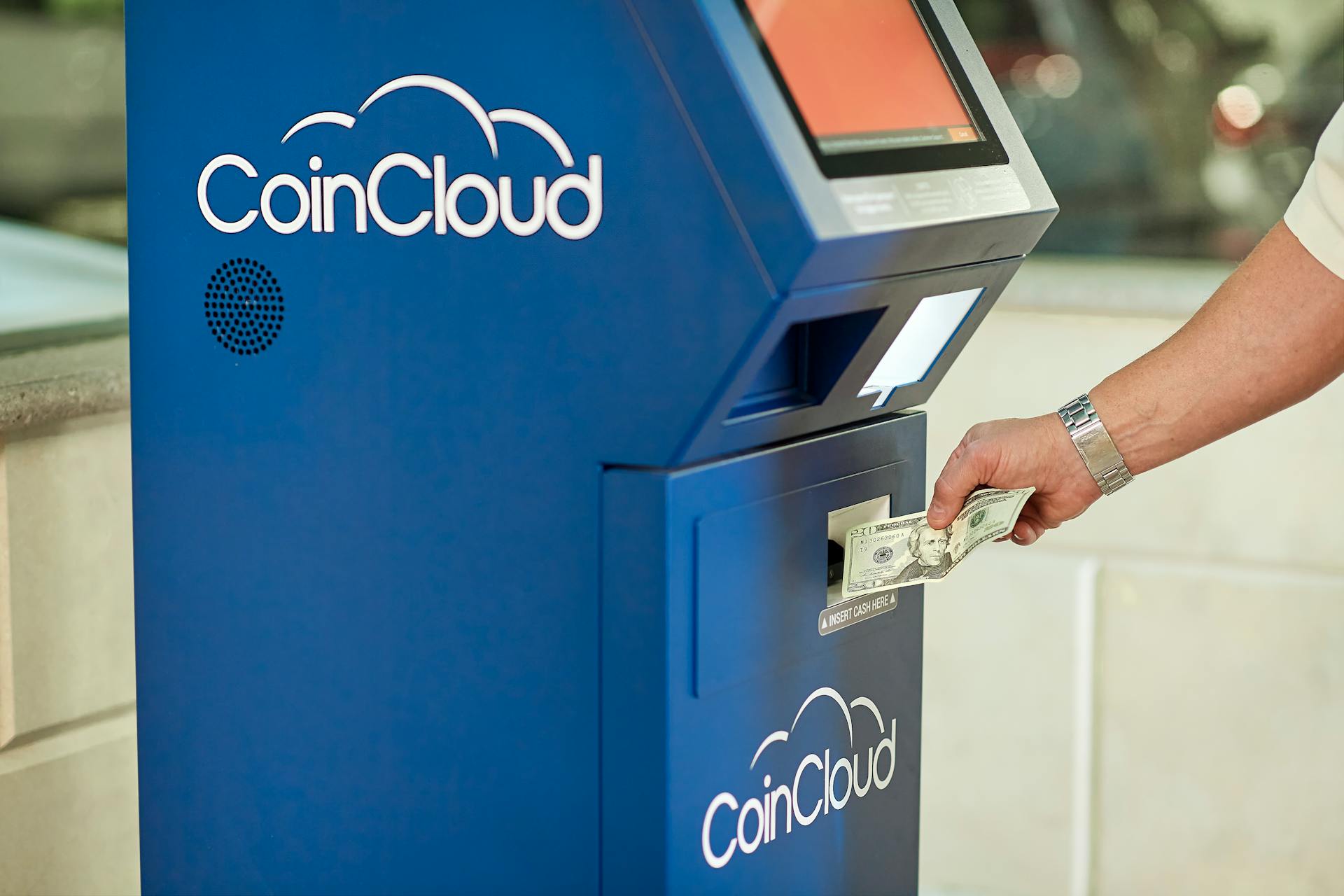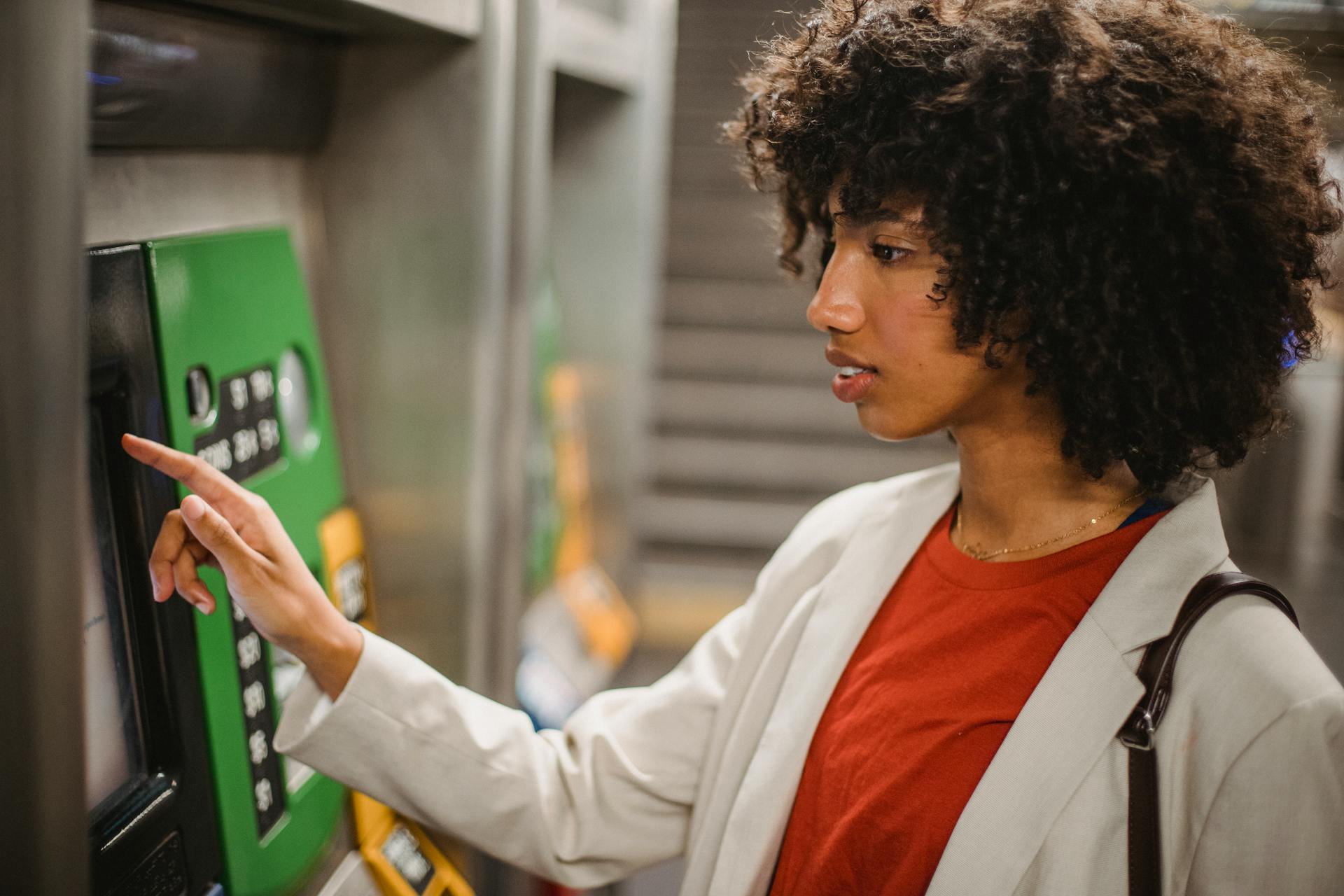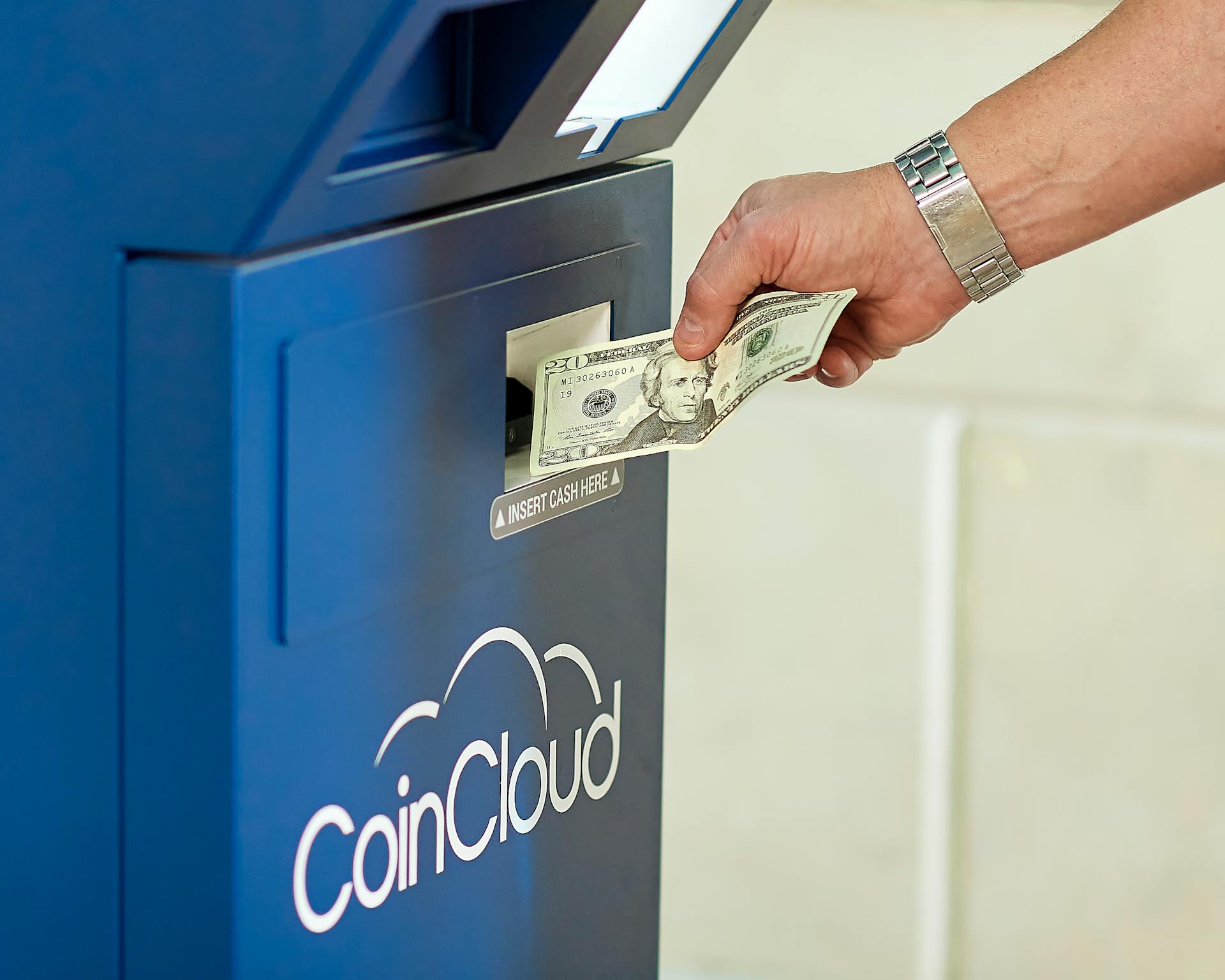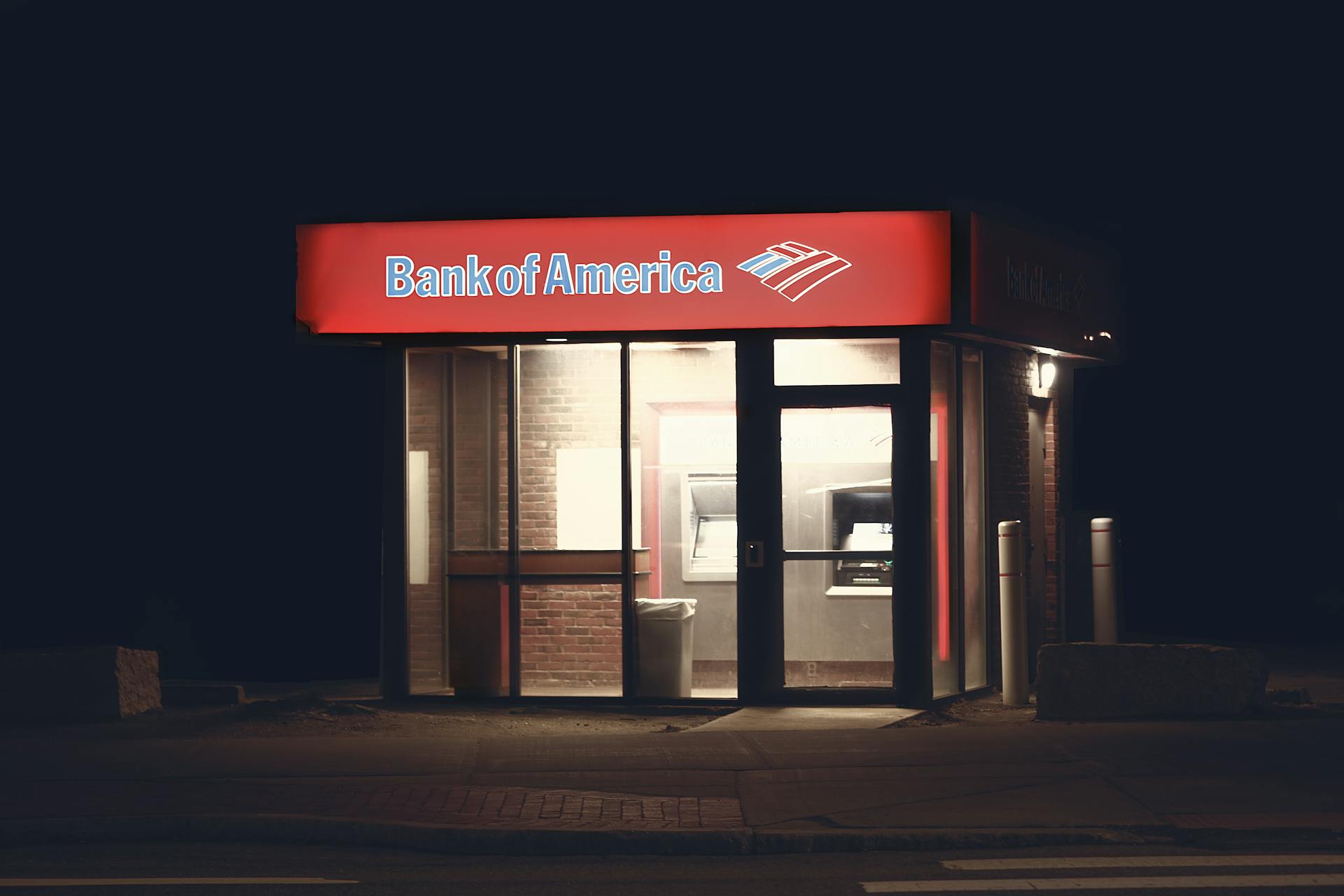
Bitcoin ATMs, also known as BTMs, have become increasingly popular in recent years, allowing users to buy and sell Bitcoin with cash.
They're typically found in public places like shopping malls, airports, and coffee shops.
These machines are usually run by private companies, not banks, and can be found in over 100 countries worldwide.
Some BTMs allow users to buy Bitcoin with cash, while others let users sell Bitcoin for cash.
The process of using a BTM is relatively straightforward, and users can usually expect to receive their Bitcoin within a few minutes.
On a similar theme: Sell Bitcoins Canada
What Is a Bitcoin ATM?
A Bitcoin ATM, also known as a BTM, is a kiosk that allows users to buy or sell Bitcoin with cash. These machines are typically found in retail stores, shopping malls, and other public areas.
You can use a Bitcoin ATM to purchase Bitcoin with cash, which is then loaded onto a digital wallet. Some Bitcoin ATMs also allow you to sell Bitcoin for cash.
The first Bitcoin ATM was launched in 2013 in Vancouver, Canada. It was called the Robocoin ATM.
Buying and Selling Bitcoin
Buying and selling bitcoin from a Bitcoin ATM is a relatively straightforward process. You can buy or sell bitcoin, depending on local regulations and the amount you're transacting.
To buy bitcoin from a Bitcoin ATM, you'll need to enter the amount to purchase, which may require verifying your identity in some cases. You'll then provide your Bitcoin wallet address by scanning the QR code displayed in your Bitcoin wallet app.
You can pay with cash or other accepted methods, such as a credit card or payment app. The Bitcoin ATM will provide a transaction ID to monitor the status of the purchase, and you'll receive the bitcoin in your wallet within a few minutes.
To sell bitcoin from a Bitcoin ATM, you'll enter the amount to sell and may be required to verify your identity. You'll then send bitcoin to the provided address by scanning the QR code and using your Bitcoin wallet app.
Discover more: Free Cash App Atm near Me No Fees
The Bitcoin ATM will generate a Bitcoin address for the transaction and will dispense your cash once it receives the bitcoin. The transaction should take a few minutes, and you can monitor the status using your Bitcoin wallet app.
Here's a step-by-step summary of the buying and selling process:
- Buying: Enter the amount to purchase, verify identity, provide wallet address, pay, and receive bitcoin.
- Selling: Enter the amount to sell, verify identity, send bitcoin to the provided address, and take your cash.
Bitcoin ATM Providers
Bitcoin ATM Providers offer a convenient way to buy and sell Bitcoin with cash. They are typically located in retail stores, shopping malls, and other public areas.
LibertyX is a well-known Bitcoin ATM provider with over 2,000 locations across the US.
Coinstar kiosks, found in many grocery stores, also offer Bitcoin purchasing capabilities.
Providers
There are several Bitcoin ATM providers that offer a range of services.
General Bytes is a leading provider of Bitcoin ATMs, with over 5,000 machines installed worldwide.
Genesis Coin offers a variety of Bitcoin ATM models, including the Genesis 1 and Genesis 2.
BitAccess provides a range of Bitcoin ATM services, including support for multiple cryptocurrencies and a user-friendly interface.
Coinsource is one of the largest Bitcoin ATM providers in the US, with over 200 machines across 18 states.
Machine Cost for $1,000
The cost of using a Bitcoin ATM can vary depending on the vendor. Byte Federal's ATMs can charge between 10% and 25% of the total transaction amount.
Some vendors are more competitive, like CoinFlip ATMs, which charge between 4.99% and 21.90% of the total transaction amount.
It's essential to know the fees associated with a Bitcoin ATM before using it, as they can add up quickly.
Take a look at this: At Which Bitcoin Amount Do I Need Offline Wallet
Bitcoin ATM Locations and Fees
Bitcoin ATMs are becoming increasingly popular in the U.S., with over 31,000 kiosks installed as of July 2024, according to Coin ATM Radar.
Some Bitcoin ATMs are operated by companies focused on the cryptocurrency industry, and may require customers to have an account to conduct a transaction.
These companies may charge high transaction fees, with some operators like CoinFlip charging between 4.99% and 21.90% of the total transaction amount.
Before using a Bitcoin ATM, it's essential to research potential fees charged and look for the lowest fees, as some operators may not disclose the total cost to customers.
Bitcoin Depot ATMs, for example, may charge up to 20 percent in exchange fees, highlighting the need for careful research before using a Bitcoin ATM.
Here's an interesting read: ATM Burglaries Using Explosives
Locations
There are over 31,000 Bitcoin ATMs installed in the U.S. as of July 2024.
These ATMs are more likely to be owned and operated by companies focused on the cryptocurrency industry.
Some companies that operate Bitcoin ATMs also offer their own trading platforms or wallets, which may require customers to have an account to conduct transactions.
In these cases, the process works similarly to a bank, where customers need to be registered to use the services.
Fees
Fees can add up quickly when using a Bitcoin ATM. In fact, some operators charge as high as 21.90% of your total transaction amount.
You may be surprised to learn that some Bitcoin ATMs don't even disclose the total cost to customers. Truthout reports that Bitcoin Depot ATMs may charge up to 20 percent in exchange fees.
On the other hand, online cryptocurrency exchanges often have much lower fees. You can find exchanges with transaction fees of less than 1 percent, making them a more cost-effective option.
Some Bitcoin ATMs also charge a variable miner fee, which is used to pay Bitcoin miners for their work. This fee can add to your overall cost.
Before using a Bitcoin ATM, it's essential to research the potential fees charged and look for the lowest fees available.
Broaden your view: How to Add Money to Bitcoin Wallet
Compliance
Compliance is a crucial aspect of operating a Bitcoin ATM. In the United States, Bitcoin ATM operators must register with the Financial Crimes Enforcement Network (FinCEN) and comply with anti-money laundering provisions of the Bank Secrecy Act (BSA).
To ensure compliance, Bitcoin ATM operators need to adjust the limits on deposits and withdrawals according to AML/KYC standards applicable in their jurisdiction. This includes obtaining a money transmitter license in some countries or states.
In the United States, Bitcoin ATM operators must be registered as Money Service Businesses and are regulated by the Financial Crimes Enforcement Network. This means they must establish and maintain an effective written AML program to prevent money laundering and the financing of terrorist activities.
The Financial Conduct Authority (FCA) in the United Kingdom declared that all cryptocurrency ATMs in the country were illegal in March 2022. This was due to a failure to comply with know your customer laws (KYC) and the high risk to customers from lack of regulation and protection.
To comply with regulations, most Bitcoin ATMs in the United States will ask for your name and other identifiable information. They may also require you to have an account and scan a government-issued identification, such as a driver's license, before completing a transaction.
For another approach, see: ATM Network BH Mreža
Security and Risks
Lack of cryptocurrency options is a significant risk when using Bitcoin ATMs. Typically, you can only trade cash for Bitcoin, limiting your options if you're interested in buying other types of cryptocurrency.
Frequent targeting by scammers is another major concern. In 2021, the FBI noted an increase in scammers directing victims to retrieve or send money through Bitcoin ATMs under false pretenses.
Lack of protection is a harsh reality when using Bitcoin ATMs. Bitcoin and other cryptocurrencies aren't regulated by the federal government, meaning your funds aren't insured by the Federal Deposit Insurance Corp. (FDIC) like they would be in a bank account.
Discover more: When Was the First Bitcoin Atm Installed
Risks
Using a Bitcoin ATM comes with some significant risks. One of the biggest downsides is the lack of cryptocurrency options. Typically, Bitcoin ATMs only allow you to trade cash in for Bitcoin, so if you're looking to buy other types of cryptocurrency, you'll likely need to go to an online crypto exchange.
Frequent scams are a major concern. In 2021, the FBI noted an increase in scammers directing victims to retrieve or send money through Bitcoin ATMs under false pretenses. This can be especially difficult to track down and recover funds from.
Another risk is the lack of protection for your funds. Bitcoin and other cryptocurrencies aren't regulated by the federal government, which means they're not insured by the FDIC like bank accounts are.
Here are some common ways scammers use Bitcoin ATMs:
- Emails or texts claiming you need to pay bills or transfer money using a Bitcoin ATM
- Social media messages asking you to use a Bitcoin ATM to pay ransoms or other schemes
If you receive any communications directing you to a Bitcoin ATM, it's most likely a scam. Legitimate companies will not ask you to use cryptocurrency or only a crypto ATM to make a payment.
Benefits and Risks
The benefits of prioritizing security and risk management far outweigh the costs. Many organizations have seen a significant reduction in data breaches and cyber attacks by implementing robust security measures.
Having a comprehensive security plan in place can save a company millions of dollars in potential losses. According to a study, the average cost of a data breach is around $3.86 million.
A fresh viewpoint: Security of Automated Teller Machines
A well-structured security framework can also improve employee productivity and morale. With reduced downtime and fewer security-related issues, employees can focus on their core tasks.
However, there are also risks associated with prioritizing security, such as the potential for over-engineering and excessive spending on security measures. This can lead to a false sense of security and create new vulnerabilities.
In fact, a study found that 60% of organizations over-invest in security, leading to unnecessary costs and complexities. It's essential to strike a balance between security and functionality.
The risks of not prioritizing security, on the other hand, are far more significant. A single data breach can have devastating consequences for a company's reputation and bottom line.
A different take: Bitcoin Atm Milwaukee - Coinhub
Frequently Asked Questions
Which Bitcoin ATM accepts cash?
Coinhub's Bitcoin ATMs accept cash, with daily limits of up to $50,000. Find a location near you using our interactive map finder.
Can you withdraw cash from a crypto ATM?
Yes, you can withdraw cash from a crypto ATM, but it's not like a traditional ATM - you'll need to send your Bitcoin to the machine's QR code first. Learn how to use a Bitcoin ATM to get cash quickly and easily.
Can I send $10,000 through Bitcoin ATM?
Yes, you can send up to $10,000 through a Bitcoin ATM, but be prepared for identity verification.
How much is $1 Bitcoin in US dollars?
As of now, 1 Bitcoin is equivalent to approximately $92,481 in US dollars. Check the latest exchange rates for the most up-to-date information.
Featured Images: pexels.com


